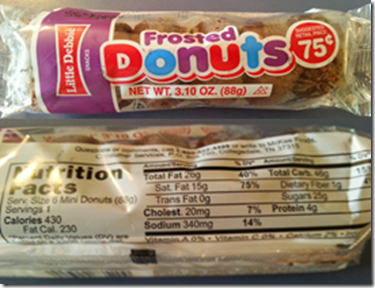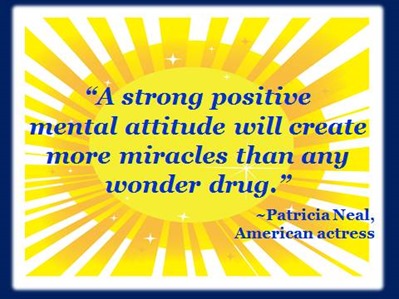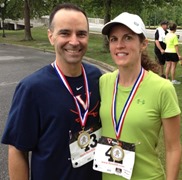As I was checking out of the grocery store the other day, a display near the register caught my attention. It was an end of aisle snack display. With a 75 cent price tag, I’m sure they get picked up easily and without much thought. As you know, I love to check the Nutrition Facts Labels. So I had to take a look at the Little Debbie display of donuts, Honey Buns, Ho Ho’s, and other sweet snacks. I will always check the most important number first: SERVING SIZE. Fortunately, the serving size for all of the items was one whole package. Knowing that my kids would prefer the donuts, I picked up the Chocolate Frosted Mini Donuts. With six donuts in a package, I could see each child downing one package a piece.
 Let’s look at the Nutrition Facts: 1 package, of 6 mini donuts, provides 430 calories with 26 grams of Total Fat and 15 grams of Saturated Fat. This product also provides 340 mg of Sodium.
Let’s look at the Nutrition Facts: 1 package, of 6 mini donuts, provides 430 calories with 26 grams of Total Fat and 15 grams of Saturated Fat. This product also provides 340 mg of Sodium.
So what does that mean? It depends. Depends on your nutritional needs and your health history! To give you an idea of where your needs may fall, women generally require between 1500-1900 calories a day. Total Fat should range between about 50 to 65 grams and Saturated Fat no more than 8 to 10 grams. Men require around 1800-2400 calories a day. Total Fat should range between 60-80 grams and Saturated Fat between 10 to 14 grams. All Americans would benefit from keeping Sodium intake below 2000 mg each day.
Keep in mind, these are just general guidelines. To find out your individualized needs, see a Registered Dietitian and have them perform a Nutrition Evaluation.
If we use the guidelines above, eating just one serving of these mini donuts will exceed the daily requirements of Saturated Fat for both men and women and significantly add to the Total Fat for both as well.
The 340 mg of Sodium accounts for 17% of your daily intake total.
If you ate just one of the six donuts, you would still get 70 calories, 4 grams of Total Fat, 2.5 grams of Saturated Fat, and 55 mg of Sodium. You can see how the calories and fat add up quickly.
Remember, this is a snack food, not a meal. So if you were to eat it and later had a meal, your fat and saturated fats would increase as well. These numbers are significant. I often have clients tell me that they are not eating much, yet cannot lose the weight they thought they should be losing. Eating small amounts of foods like those shown here can make it difficult to reach your nutrition goals.
People often talk that all foods are ok in moderation. That is true. However, if we are not sure what moderation is or we are not mindful of the amounts and types of foods we eat each day, we will find ourselves getting into nutritional trouble.
So as you get ready to celebrate the Memorial Day weekend, be aware of your food AND beverage choices! Those liquid calories can add up quickly also. Make sure to add some fruits and vegetables to your meals, drink plenty of water and truly follow the concept of moderation. You’ll feel better and your body will thank you!
It’s Your Health. It’s Your Life. Make That Change!
~John

 f Diabetes
f Diabetes





